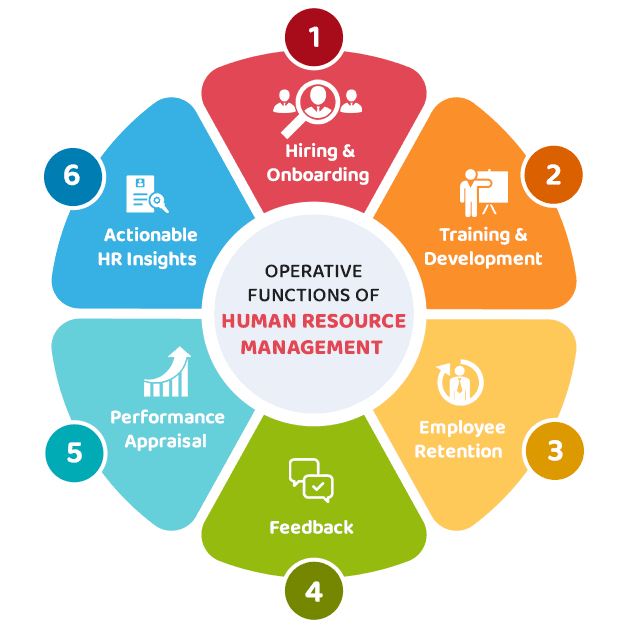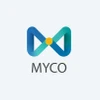10 Major Functions of HRM (Operative and Managerial) in 2026

Behind every successful organisation is an ever-hustling HR team. It is an integral part of any organisation and acts as a bridge between employees and the organisation.
Human resource professionals bring in the best talent on board and nourish them towards achieving organizational objectives. Workforce management is an ongoing process that involves formulating policies and conducting training & development programs to uplift the morale of employees and achieve the set target.
The functions of human resource management extend way beyond just hiring and payroll processing. From basic HR functions to making a strategic decision, HR management includes every task that affects the workforce of an organization.

What Is Human Resource Management?
Human resource management is a strategic and comprehensive approach to managing the people and culture of a workplace. It is a continuously evolving process that enables employees to contribute enthusiastically towards the achievement of organizational objectives.
The Role of HRM in Organizations
Human resource management processes help in defining and maintaining the vision, mission, and values of a company.
Some of the primary functions of HRM are job analysis and job design, hiring/ recruitment, training and development, reward and recognition, compensation and benefits, performance control, administrative relations, and managing work relations.
HRM is an interdisciplinary activity that comes with unlimited scope. The scope of HRM basically refers to all the activities that fall under the flag of workforce management. Understanding the monetary and non-monetary needs of employees to enhance productivity is an important scope of HRM.
Scope of HRM further includes performance review, assessment, recruitment, employee engagement process, growth, resource planning, and grievance redressal.
Importance of HRM or Human Resource Management in Small Business
From ensuring employee well-being to maintaining values of a company, HRM is considered as one of the most important components in any organization.
HRM practices help a company attain its objectives by creating and maintaining a positive attitude at work as well as contributing to corporate decision-making. Apart from this, HRM teams perform various other roles, among which job design, hiring, training and development, and performance management are the most crucial ones. HRM professionals keep employees updated with the right skills that are required to adjust with the rapidly changing environment and technology.
Human resource management teams are further involved in conflict resolution and compliance management. They work dedicatedly towards creating a positive work culture where employees are recognized and valued for their contributions.
Suggested Read: Difference Between Personnel Management and Human Resource Management
Features of HRM or Human Resource Management

Here are some of the most important characteristics of HRM that you must know:
- People Oriented
This is one of the most obvious features of HRM. As the term implies, humans are what HRM comprises and hence people must be the center of any HR management policy. In brief, HRM is the process of aligning people and organizational efforts so that the goals of both the parties are accomplished.
- Individual Oriented
For smooth human resource management, it is important to take out time to meet individual employees and get feedback. The ability to develop genuine relationships with people is crucial for any HR.
- Future Oriented
Whether it is meeting new trends or changes in the work environment, the HR department plays a pivotal role in developing future goals and objectives of the company.
- Decision Oriented
HR relies on market facts and data as well as internal feedback to provide accurate and helpful information. These facts greatly influence the decision-making process, and in many cases, help them analyze potential outcomes.
- Development Oriented
The role of HRM team is to ensure the development of employees in an organization. The other part of their job also involves supporting company goals. For this, they must keep up with the pace of business growth and prepare strategies accordingly.
- Employee Oriented
One of the vital characteristics of HRM is to make the lives of employees at work simpler. HR professionals should be able to create a happy workplace environment where employees actually feel like coming in and putting in their best effort.
- Action Oriented
The role of HRM team is not all about written regulations. They must constantly check on how employees are doing and take immediate action to solve their problems, if any, that may arise at the workplace.
Suggested Read: List of Best HR Software In India – HRMS Software Companies
Benefits of Human Resource Management

Human Resource Management is a process that simplifies workforce management functions and offers several benefits.
- Better Human Capital Management
One of the biggest advantages of HRM is that it defines a process for managing an organisation’s capital management. It builds an entire system that the human resource department can utilize to pick and deliver the best talent pool and give them personalized training to achieve organisational goals.
- Streamlined Recruitment Process
Effective HR process makes it easier to attract the best talents and retain them for a long time. The hiring managers get a database where candidates’ information with their job skills, experience, and tentative joining date is mentioned.
The human resource management process also involves running social media campaigns to create a positive image of the company, backed by achievements, recognitions, and the work culture. Streamlining the recruitment process is one of the essential functions of the HR manager.
- Identify and Bridge the Capability Gap
Many times, companies face the challenge of capability gap and skill shortage because of the ever-changing expectation from a job profile. In this case, the HRM team can identify the capability gap in the workforce and create strategies to attract and retain fresh talents and veterans.
- Suitable Career Planning
The management team comes up with new training and development programs to help employees acquire new skills and grow in their careers. The HR team identifies capability gaps via training, surveys, feedback and performance review. This provides employees with a clear picture of areas where they need to improve.
Objectives of Human Resource Management
Human resource management includes broader objectives like creating a competitive edge for an organization using human skills and knowledge.
The objective of HRM include:
- Boosting Efficiency: HR management includes payroll processing, performance tracking, conducting training and development programs, providing incentives, etc. to increase the efficiency of the workforce.
- Organizational Engineering: HR management is essential to create an efficient organizational hierarchy for better workflow and accountability. HR management also includes drafting rules, regulations, and policies for smooth operation.
- Compensation processing: One of the significant objective of HR is to process the net pay of staff with accuracy. This is the most important function of HR management.
- Compliance Management: Organizations need to comply with various laws and regulations implemented by the government. Calculating, deducting, and depositing statutory deductions TDS, PF and ESIC are included in HR’s primary functions.
Suggested Read: Functions of Human Capital Management (HCM) Software
Basic Functions of Human Resource Management
The primary function of human resource management is to encourage employees towards achieving organizational objectives. The basic HR functions can be broadly divided into two categories: Operative Functions and Managerial Functions.
| Operative Functions of HRM | Managerial Functions of HRM |
|---|---|
| Hiring & Onboarding | Planning |
| Training & Development | Organizing |
| Employee Retention | Directing |
| Feedback | Controlling |
| Performance Appraisal | |
| Actionable HR Insights |
Operative Functions of HRM

The functions of the human resource department performed at the mid-level are known as the operative functions. Operative functions of human resource management are directed towards the execution of plans and strategies designed by the senior managers of a company.
Operative Functions of HRM includes hiring talent, orientation, employee retention, actionable insights, training & development, feedback & performance appraisal. Learn in-depth about all of these.
Hiring Talent: One of the primary functions of the human resources department is to hire people who are a perfect fit for the organization. Along with quick and effective hiring, the HR team also ensures smooth onboarding.
Orientation: Human resources managers ensure that legal formalities are effectively completed from every employee’s side. After that, they introduce them to the company policies, principles and working culture.
Training and Development: The working needs of every company differ from one another. Employees are provided with adequate training so that they are on track with the team’s requirements.
Employee Retention: The HR team ensures that employees stay productive at work and deliver their best performance. They try to develop a culture of work and fun.
Feedback and Performance Appraisal: Human resource management team creates a systematic process to improve productivity and work efficiency. They create a flow where employees receive feedback from senior managers at regular intervals.
Provide Actionable Insights: HR insights help the management drive important metrics for employee engagement. Performance data, employee benefits, their skills, claims, company turnover and other vital statistics can help an organisation improve its work culture and stay closer to achieving goals & objectives.
Managerial Functions of HRM

These processes provide important insights to help the top management in strategizing and successfully implementing the designed schemes, It is one of HR’s main functions.
Basic managerial functions of HRM are the following:
- Planning
Planning is the first and foremost managerial function of HRM. The importance of human resource planning involves determining the ways to achieve higher productivity.
At the planning stage, leaders in a company also determine the requirement of resources across different organizations. In brief, HRM planning is fundamental to recruitment, retention & other skills required to achieve company objectives.
- Organising
After establishing the objective and setting the plan, managers now jump to the second stage of managerial functions. The secondary function of HRM is to make available all possible resources to carry out multiple operations.
The functions of HR managers include setting a framework of operative tasks by dividing the activities into functions and positions. They also assign activities as per the groups, delegate authority and responsibility as per the task.
- Directing
Implementation of a strategy depends on how convinced or motivated the employees are. Therefore, the third managerial function involved encouraging and directing people at work so that they are aligned with the organizational goal.
Human resource management functions help in keeping mo employees motivated by taking care of their career planning and monetary needs.
- Controlling
The last function of HRM is all about regulating the activities according to the plan. The managers now can observe and chalk out the progress as per the set standards.
Further, they can also figure out deviations, evaluate and control the department wise progress with respect to operative functions and take necessary actions.
Suggested Read: Key Roles and Responsibilities of HR Managers in Post Pandemic World
Primary Responsibilities and Skills of the Human Resource (HR) Manager
HR managers are senior employees of the organizations responsible for handling and controlling all the HR-related tasks.
The primary functions of HR manager could be divided into three main categories
- Administrative Responsibilities: HR managers must oversee all the hiring, onboarding, payroll, organization structure, and other employment processes. They must delegate tasks, responsibilities and take follow-ups from other HR personnel.
- Change management Role: Ensuring that employees understand and align with the mission and vision of the company is one of the crucial responsibilities of HR managers. They also have to identify and improvise the areas that need changes.
- People management: Retaining employees, creating learning opportunities, resolving conflicts, addressing complaints, etc., are some of the people’s management tasks HR managers are responsible for handling.
Skills of HR Managers
HR managers must have some basic skills to oversee all the workforce of an organization. An HR manager is expected to have:
- Knowledge of human resources laws, labor contracts, hiring, and standard industry practices
- General skills like observing people’s behavior, communicating effectively, and establishing rapport with employees
- Ability to draft and smartly enforce HR policies, rules, and SOP
- Strategic thinking and proactive planning capabilities
- Decision making and problem-solving abilities
- Capable of systematically delegating and organizing all HR-related tasks.
How Does HRM Work?
Human Resource Management is a continuously evolving process that works by integrating multiple components. 3 Major components that makes HRM work are:
- People: HRM is all about managing ‘people’ by people. HRM is only possible when it is implemented by HR personnel. The HR department is a group of people responsible for managing the workforce from recruitment to their departure.
- Policy: HR policies are the rules, guidelines, and standards that employees must follow to do their job. HRM works according to the HR policies of the organization.
- System: HR systems are the tools and procedures HR managers use to support their policy work. It integrates different hardware and software designed to provide easy access to information, efficient processing of paperwork, and clear communication between HR and other departments within an organization.
All these components are integrated, making HRM function a critical business process for any organization. HRM works by combining people, policies, and the system of the organization.
Suggested Read: What is Human Capital Management (HCM)?
Top HRM Trends in 2026
Human resource management is a dynamic business process. HR functions in a company evolve with time. Here are the top HR management trends of 2026 that could become the standard HR practice in the coming days.
- Hybrid Work Culture: The trend of remote working is rising because it provides employees with a work-life balance while improving productivity. My companies have already adopted a hybrid work culture by allowing their employees to work from home 2-3 days a week. This HR trend could soon be a standard HR practice as it increases the efficiency of employees and helps to retain them longer.
- Remote Learning and Training: The rise of e-recruitment and work from home culture has brought this remote learning and training trend. Employees could access learning platforms, webinars, and eBooks of the companies to learn and develop skills remotely.
- Mental Health Support: Many companies are addressing employee mental health issues and providing support for them. This approach has been helping companies reduce employee turnover and increase productivity and is supposed to be a primary HR practice in the near future.
Suggested Read: List of Best HR Software in India – HRMS Software Companies | 7 Steps of Human Resource Planning
Conclusion
Human Resource Management (HRM) is an intangible asset that binds together all the factors that are required to meet the organisational objective. The contribution of HR managers towards the success of any organisation is unimaginable.
FAQs on Human Resource Management Functions
What is HRM definition?
Human Resource Management is a strategic and comprehensive approach to managing the people and culture of a workplace. It is a continuously evolving process that enables employees to contribute well towards the achievement of organisational objectives.
What are the major functions of HRM?
Some of the primary functions of HRM are job analysis and job design, hiring/ recruitment, training and development, reward and recognition, benefits administration, performance management, and more. It controls and oversees all the HR activities in a company.
What is the importance of HRM?
The importance of human resources is indispensable for an organisation. It bridges the gap between employees’ aspirations and the organisation's strategic goals. An efficient HR management strategy keeps the organisation one step ahead of the competition.
What is the difference between personnel management and HRM?
Personnel management is based on the theory that employee behavior can be manipulated as per the core competencies of the organization.
On the other hand, human resource management has a wider scope and focuses on aligning employee goals with organizational objectives, accountability, compensation, etc.What are the five main areas of HR?
Employee recruitment, employee training, payroll processing, compliance management, and internal relations are the five main areas of HR.
What is HRM in simple words?
In simple words, HR management is efficiently managing the workforce of an organization to maintain compliance and boost productivity.
How many types of HR roles are there?
There are mainly three types of HR roles: Administrative Role, Change Management Role, and People Management Role.
Which is best: Marketing or HR?
Both fields are different, and the growth of an individual in each profile depends on their skills and preferences. Marketing demands excellent interpersonal skills with an innovative mindset, while HR requires high operational and management skills.
What does a human resource manager do?
Human resource managers oversee all workforce-related operations of a company. From hiring new employees and payroll processing to their training and releasing, HR managers plan and conduct all these operations to maintain an efficient workforce.
What are the 7 functions of HR?
1. Recruitment and Employee Screening
2. Benefits and Compensation
3. Performance Evaluation
4. Employee Relations Management
5. Disciplinary Actions
6. Employee Records Managment
7. Continued Training Education.What are the operative functions of HRM?
The operative functions of human resource management are directed towards specific activities which are handled by the HR department in an organization. This involves employment, training and development, compensation and feedback and performance appraisal.
What are the functions of HRM in an organization?
Some of the primary functions of human resource management in an organization include recruitment and hiring and selection, ongoing training and development, directing and organizing company activities & more.
How functions of HRM can provide talent and skills?
A few HRM functions that can provide talent and skills include employee engagement and communication, skill development, employee on/off the job training, learning and development program & more.
What is the most important function of HRM?
Employee hiring and selection is one of the primary functions of human resource management. The role of HRM professionals is to hire the right talent and manage them effectively to meet the company’s current and future goals.
What are the primary functions of HRM?
Job designing and analysis, training and development, and performance management are among the primary functions of human resource management.
What are the basic functions of HRM?
Some of the important duties of human resource management professionals include recruitment and hiring, talent management, employee benefits, and overseeing disciplinary action.
The managerial functions of HRM does not include what?
The managerial function of HRM does not involve financial planning or cost control. Managerial function is primarily concerned with hiring and maintaining an effective workforce within an organization.
The operational functions of HRM does not include what?
The operational function of HRM does not directly involve planning, organizing, directing and controlling the HR related activities in an organization.
How is HRM related to other functions of a business?
HR managers are primarily concerned with the most important asset, that is, human capital in an organization. Hence, they must communicate and interact well with other departments such as sales, research, accounting, finance and others in order to hire the appropriate people with the required skills.
What does a human resource manager do?
Human resource managers plan, coordinate and supervise the hiring of new employees. They even oversee employee training and development programs and workplace policies.
Explain the functions of HRM?
HRM is an essential department in any organization. It is responsible for performing 4 major functions including planning, organizing, directing and controlling company activities.
What are the responsibilities of HR?
The major responsibilities of HR managers include attracting and hiring the right talent, running payroll, creating workspace policies, organizing training sessions for employees and so on.
Related Categories: HR Software | Payroll Management Software | Attendance Management Software
The Techjockey content team is a passionate group of writers and editors dedicated to helping businesses make informed software buying decisions. We have a deep understanding of the Indian software market and the challenges that businesses face when choosing the right software for their needs. We are committed... Read more




























